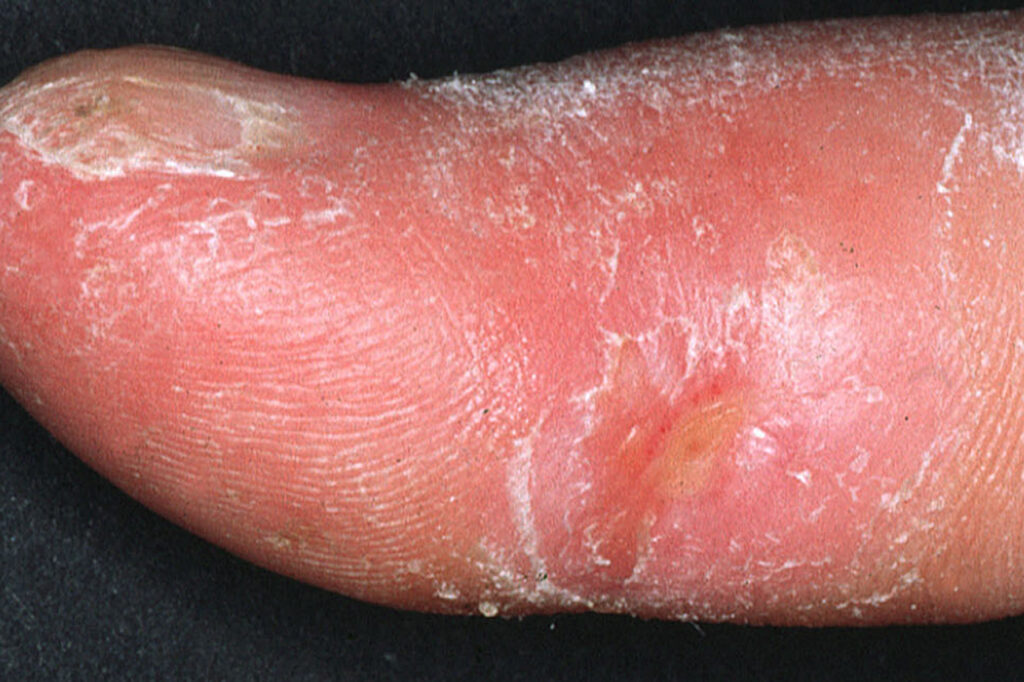Table of Contents
Systemic Sclerosis (Scleroderma): Symptoms, Causes & Effective Management
This condition, also known as Scleroderma, is a chronic autoimmune disease characterized by hardening and tightening of the skin and connective tissues. It affects not only the skin but also internal organs, blood vessels, and the immune system. This condition can be localized or systemic. Localized Scleroderma, which is milder, affects only the skin and underlying tissues. Systemic Sclerosis is more severe and can affect internal organs such as the heart, lungs, kidneys, and digestive tract.

Quick Facts
- Prevalence: Affects approximately 0.02-0.04% of the global population.
- Common Symptoms: Skin thickening, Raynaud’s phenomenon, digestive problems.
- Affected Population: Most commonly diagnosed between ages 30 and 50, predominantly in women.
Understanding Systemic Sclerosis
This disease occurs when the immune system triggers excessive collagen production, leading to fibrosis or scarring of tissues. This fibrosis affects skin elasticity and function of internal organs such as the lungs, heart, kidneys, and digestive system. Disease progression varies greatly among individuals.
Common Symptoms
Early detection and intervention significantly enhance management and outcomes:
- Skin thickening and hardening, often affecting hands and face
- Raynaud’s phenomenon (fingers and toes turning white or blue in response to cold or stress)
- Swelling, stiffness, or pain in joints
- Digestive issues, including difficulty swallowing, reflux, and bowel dysfunction
- Shortness of breath due to lung involvement
- Fatigue and muscle weakness
- Visible blood vessels (telangiectasia)
Causes and Risk Factors
While the exact cause of this disease remains unknown, several contributing factors include:
- Genetic Predisposition: Increased risk in individuals with family members affected by autoimmune disorders.
- Environmental Factors: Exposure to certain chemicals, silica dust, or toxins.
- Immune Dysfunction: An abnormal immune response triggering excessive collagen production and fibrosis.
Diagnosis
Diagnosing this condition typically involves:
- Medical History: Comprehensive evaluation of symptoms, personal and family medical background.
- Physical Examination: Assessing skin changes, joint movement, and signs of internal organ involvement.
- Laboratory Tests: Blood tests for specific autoantibodies (e.g., ANA, anti-centromere, anti-Scl-70).
- Imaging and Functional Tests: Chest X-rays, echocardiograms, pulmonary function tests, and gastrointestinal evaluations.
Effective Treatments and Management
Although no cure exists, effective treatments manage symptoms, prevent complications, and enhance quality of life:
- Medication: Immunosuppressants, calcium channel blockers for Raynaud’s, and medications for digestive issues.
- Physical and Occupational Therapy: Improving joint flexibility, managing pain, and maintaining functionality.
- Lifestyle Modifications: Avoiding cold temperatures, stress management, regular exercise, and dietary adjustments for digestive health.
- Regular Monitoring: Routine check-ups to monitor internal organ function and promptly address complications.
Potential Complications if Left Untreated
Untreated or poorly managed systemic sclerosis can result in serious complications:
- Pulmonary fibrosis leading to breathing difficulties
- Pulmonary hypertension affecting heart function
- Kidney problems, including scleroderma renal crisis
- Severe digestive tract involvement, affecting nutritional status and quality of life
- Joint contractures causing mobility restrictions
When to See a Doctor
Seek medical advice if experiencing persistent skin changes, Raynaud’s phenomenon, unexplained joint pain, digestive issues, or breathing difficulties. Early diagnosis and effective management can significantly improve outcomes.
Practical Tips for Living with the disease
Effective daily management enhances quality of life:
- Protect skin and extremities from cold exposure and injury.
- Maintain regular physical activity tailored to your capability to preserve joint and muscle function.
- Adopt dietary adjustments to support digestion and overall nutrition.
- Utilize relaxation techniques to manage stress and maintain emotional well-being.
- Engage with support groups for emotional support, practical advice, and sharing experiences.
Recent Research and Advances
Current research continues to improve understanding and management of this disease:
- Studies into targeted therapies reducing fibrosis and collagen deposition.
- Advances in early diagnostic methods using biomarkers and imaging techniques.
- Research exploring stem cell treatments and their role in tissue repair.
- Investigations into genetic and environmental influences on disease onset and progression.
Frequently Asked Questions
Is systemic sclerosis hereditary? Genetics can influence susceptibility; having family members with autoimmune diseases slightly increases risk.
Can systemic sclerosis be cured? Currently, there is no cure, but symptom management and regular monitoring significantly enhance quality of life.
Does systemic sclerosis affect life expectancy? Disease severity varies widely. With early diagnosis and effective management, many people with systemic sclerosis maintain a good quality of life and normal or near-normal life expectancy.
Additional Content
For comprehensive information on the various treatments you can explore our Autoimmune Disease Treatment page. If you are seeking expert medical advice, our Top Autoimmune Doctors section provides a list of highly recommended specialists. Additionally, for an overview of other autoimmune conditions, visit our Autoimmune Diseases page.